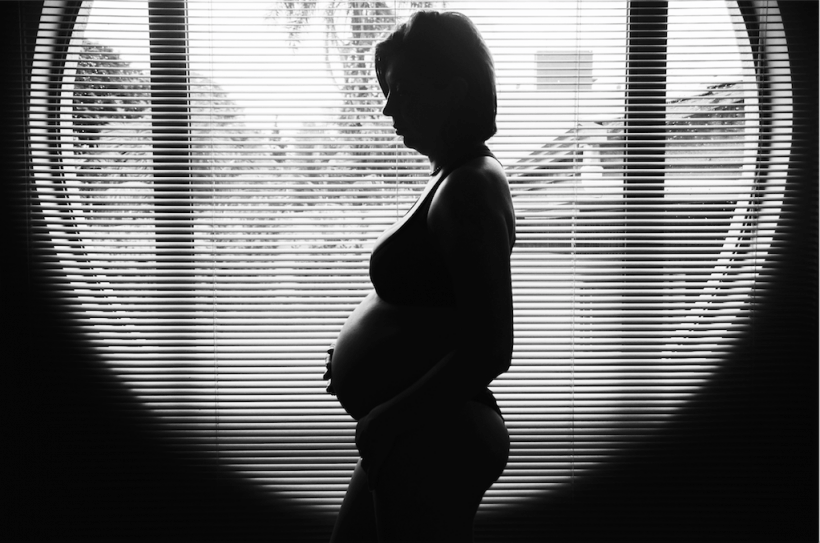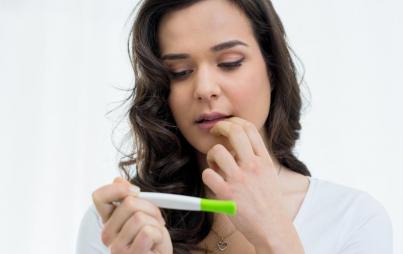
The second pregnancy with PCOS - lightning struck again. (Image Credit: Unsplash/Camila Cordeira)
When I turned 21, my body crashed.
I chalked it up to the regular 21-year-old things that are normally to blame on "being fat:" exhaustion, digestion issues, lower abdominal pain while exercising, weight gain, acne, and excruciating periods.
I was also coming out of an intense year of sleep deprivation, over-exertion, poor nutrition, and no real access to health care. There were those reasons, sure. But mostly, I was fat. And fat was reason enough, I thought.
After months of doctors visits, specialists, and encountering unbridled disbelief from multiple doctors who mostly all chalked my symptoms up to being fat, I walked into a GI specialist's office. I was weary, I was tired of not being believed. I figured I was in for the same shoulder-shrugging, disbelieving, "It's all in your head, fatty" treatment I had received for seven months.
But this doctor was different. He had three medical students. He took the most detailed "health and major event history" of my life. The intake interview with one of the students took an hour. And before I even donned the too-small examination robe, he had a theory: Poly Cystic Ovarian Syndrome (PCOS). He referred me to another specialist, and two weeks later, I underwent surgery which uncovered several spots of endometriosis in addition to my very cystic ovaries.
I was given meds and a long speech after my surgery. My uterus and ovaries were in much worse shape than my surgeon had suspected. If he had secured prior consent, he would have removed my uterus because of the extensive endometriosis and hopeless ovaries. My chances of successful pregnancies would be slim, so I needed to manage my expectations and those of my future partner. Reproductive health had to be my highest priority.
For the next seven years, I nervously shared this damning information with any man I dated for longer than a couple of weeks. When I say that it did not matter to them, I'm serious. It didn't. But it mattered to me. I was marked.
When I married my husband, we made it clear to both of our families that talking about baby-making timelines was off limits. We would initiate that conversation when we were ready, but it was too painful for me to talk about casually. I knew I was deficient, that my body had already failed me with every bloody cycle. I didn't want to be reminded of my dysfunction, and I certainly didn't want to pretend as though I was normal. I wasn't. I was broken in a way that people couldn't see.
We closed on our house and stopped on our way home to buy a bottle of champagne to celebrate with after our son went to bed. As my husband read stories and sang songs to our kid, I realized my period was late. A week late.
And then, lightning struck. I got pregnant. No fertility treatments, no surgeries, just easy, pressure-free sex with a partner who I loved and felt sure about as a future father. My body knew exactly what to do. My progesterone and HCG levels soared and, with the exception of severe morning sickness, my body accepted this new little life and carried it safely for 41 weeks and 3 days.
Maybe my body was not broken.
So when we decided to have another baby a few years later, we were devastated when my immediate pregnancy ended in a miscarriage. I had a round of lab work done and my progesterone results came back extremely low. My thyroid was not functioning. My doctor and I worked to find the right approach of meds and supplements that would replenish my body.
I became pregnant again.
I lost it again.
And again.
And again.
And again.
I should have known that lightning rarely strikes twice. My body wasn't actually okay. I got a pass, not actual healing.
I did what all broken people do. I beat myself up emotionally and psychologically. I was heavier than when we conceived our son. I didn't eat enough green foods. I hadn't been regular with my exercise. I was officially over 35, which meant my eggs were geriatric and my malfunctioning uterus was probably covered in cancerous endometrial lesions.
During all of this, my fantastic doctor reminded me that women with PCOS get pregnant every day. She was encouraged that my body could get pregnant, we just needed to understand more about my body's process. She reiterated that my weight wasn't an issue, and neither was my age. Those things were not deficiencies. Those things did not make me broken.
So, we took a closer look. My blood work came back clean. My doctor ordered an ultrasound on day 10 of my cycle to see if my body was getting ready to ovulate. And... nothing. No egg with circulating blood flow, getting ready to drop. Just fuzzy, cystic ovaries. I peed on my ovulation strips every day for two weeks, just to be sure. And nothing.
I cried. I told my husband that I needed a break. We were buying a house and about to start a major kitchen renovation, and it was the holidays. But mostly, I needed to breathe and not obsess about a baby. We would revisit the conversation after the new year, settled, ready to begin again, ready to work on a plan of action with my doctor.
We closed on our house and stopped on our way home to buy a bottle of champagne to celebrate with after our son went to bed. As my husband read stories and sang songs to our kid, I realized my period was late. A week late. I shut myself in the bathroom and peed on that blasted stick, just to make sure.
And then it happened.
Lightning struck twice.
I'm breathing the deep, relieved breaths of a woman in her second trimester now. My baby's heartbeat is strong, and their tiny face already looks exactly like Daddy's. My cystic ovaries and webbed uterus are no match for this being who is determined to be here, in spite of what I thought were my body's failings. This baby is all wrapped up in rainbows and hope, and I see now that I am not broken. I am exactly the vessel they need me to be. And that bottle of champagne is still waiting, unopened, ready to celebrate a new life.
If you would like more resources on PCOS and endometriosis, check out these helpful resources.
Endometriosis: The Complete Reference for Taking Charge of Your Health







